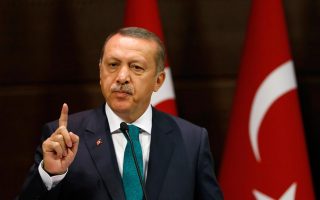The shield of law and humanism

It is difficult to believe that after Greece’s judiciary offered protection to eight members of the Turkish military, rejecting Ankara’s request for their extradition, the government would agree to the illegal, secret and inhuman expulsion of people who requested asylum here. Yet unease grows.
On Wednesday the government spokesman stated, “The Greek government does not engage in pushbacks.” Let us hope that is so.
The Hellenic League for Human Rights cites two instances where groups of Turkish citizens who requested asylum in Greece appear to have been handed over illegally to Turkish authorities.
The Council of Europe’s commissioner for human rights, Nils Muiznieks, the UN High Commissioner for Refugees and the head of the Alliance of Liberals and Democrats in the European Parliament, Guy Verhofstadt, have expressed concern at the possibility.
There is also the strange story of three Turkish military men who where arrested in Edirne last month, accused of being part of a group that intended to kidnap President Recep Tayyip Erdogan during the failed coup last July. Turkish media said the men were arrested while on their way to Greece; some Greek lawyers, however, claim that the three had crossed into Greece when they disappeared, only to turn up in Turkish custody. The Citizens’ Protection Ministry in Greece scoffed that the claims were “fairy tales.”
The case of the eight servicemen who arrived in Alexandroupoli in a helicopter the day after the coup attempt shows how difficult it is for any country to withstand Ankara’s pressure. It is understandable that no government would like to open a new front with a neighbor who can cause problems at will. But it is of paramount importance that Greece withstand such pressures.
In the past few years, among our country’s very few victories were the welcome provided to refugees and the institutional way in which it dealt with the “Eight.” Our great wound, though, is the lack of strategy, of method, of goals – of follow-up. On the refugee issue, government incompetence undermined the initial, heroic efforts of citizens.
In the case of Turkish asylum seekers, the difficulties of handling the case of the Eight should not lead to cynicism, to injustice, to the violation of international conventions. Greece has a responsibility toward its own people and toward the Turkish people, to serve the principles of humanism, to abide by the law.
Strenuous defense of these principles is part of the identity we aspire to but also our shield. And it is the best thing that we can offer our neighbors – the hope that there is something better than that which they are now enduring.





